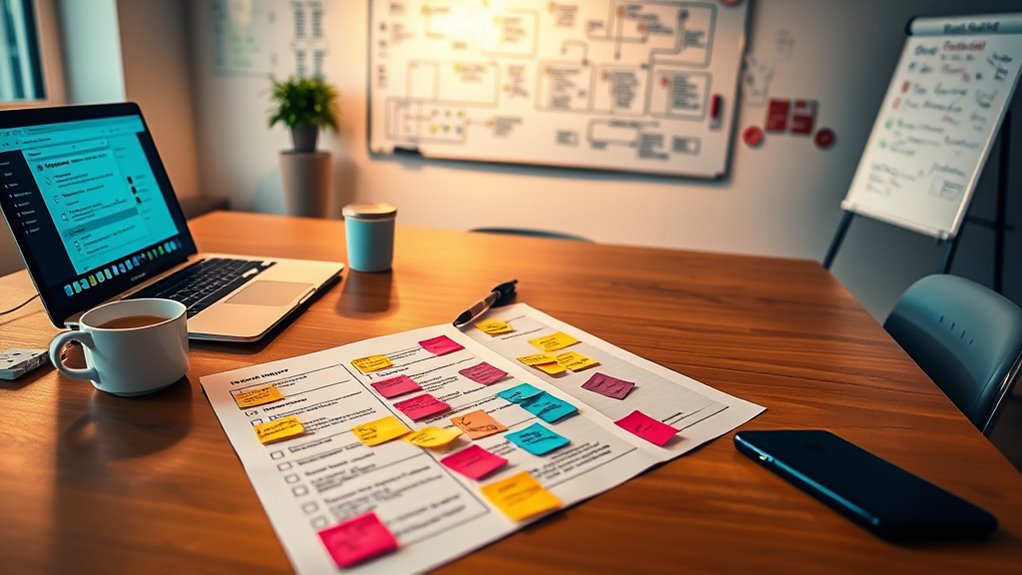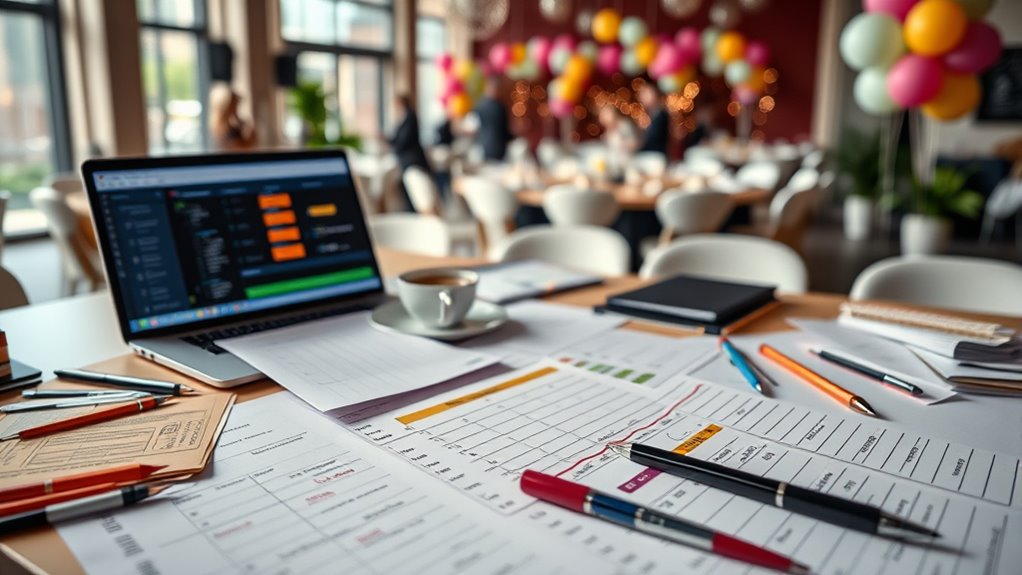A thorough event checklist guides you through every step, from initial planning to flawless execution. Start with managing your guest list and tracking RSVPs to determine your headcount. Identify and communicate with vendors early, creating a timeline for contracts and payments. Stay organized with checklists and digital tools, regularly updating your plans to accommodate changes. Keeping everything on track ensures a smooth event. Continue exploring to discover detailed tips and strategies for successful event management.
Key Takeaways
- Develop a detailed timeline and task checklist covering planning, vendor coordination, and setup phases.
- Maintain an organized guest list with RSVP tracking and seating arrangements for efficient management.
- Identify and communicate with all vendors early, setting clear expectations and deadlines.
- Regularly follow up with vendors and update contracts to ensure service quality and adherence to budget.
- Utilize digital tools and checklists to monitor deadlines, payments, and event progress for seamless execution.

Planning an event can feel overwhelming, but having a well-organized checklist makes everything manageable. One of your first steps is creating a detailed guest list. This list is the foundation for almost every decision you’ll make, from selecting the venue to determining catering needs. Be precise about who you want to invite, and consider factors like capacity, relationships, and the type of event. As you compile your guest list, keep track of RSVP responses to get an accurate headcount. This helps you avoid surprises on the day and guarantees everyone has a spot. It also guides your decisions about seating arrangements, invitations, and personalized touches. Managing your guest list efficiently means you’ll stay on top of who’s coming, who’s not, and who still needs to respond, reducing last-minute chaos. Regularly updating your guest list ensures you’re prepared for any changes that might arise. Vendor management is equally essential early in the planning process. You’ll need to identify and connect with vendors who can provide the services you require—catering, entertainment, photography, florists, and more. Creating a vendor contact list helps you keep everything organized. When reaching out, be clear about your event date, expectations, and budget. Once you’ve selected vendors, manage ongoing communication by setting deadlines for deposits, contracts, and confirmations. This prevents last-minute surprises and keeps your timeline on track. Good vendor management also involves reviewing contracts carefully and clarifying cancellation policies or contingencies. Staying organized with a vendor checklist ensures that each service provider delivers what you expect, and you remain within your budget. Regular follow-ups and updates help you maintain control over the process and build relationships that can be beneficial if any issues arise. Throughout your planning, keep your guest list and vendor management tasks intertwined. For example, your guest count influences catering choices, seating arrangements, and even vendor needs. Meanwhile, clear communication with vendors ensures that their services align with your guest list size and preferences. Using checklists and digital tools can streamline these processes, making it easier to track deadlines, payments, and important details. Staying organized allows you to focus on other aspects of your event with confidence. As you progress, revisit and update your guest list and vendor management plans regularly, keeping everything current. This proactive approach minimizes stress and maximizes your chances of executing a smooth, memorable event. Incorporating proper organization and record-keeping into your planning can significantly reduce last-minute stress and ensure nothing falls through the cracks.
Frequently Asked Questions
How Do I Customize Checklists for Different Event Types?
You can customize checklists for different event types by starting with event checklist templates tailored to each occasion. Use checklist customization tips like adding specific tasks, adjusting timelines, and including unique vendor details. Focus on the event’s scale and audience to make your checklist relevant. This way, your checklist becomes a precise tool, ensuring no detail is overlooked during planning and execution for any event type.
What Are Common Pitfalls in Event Planning Checklists?
You might think checklists cover everything, but common pitfalls often lead to overlooked details. For example, neglecting thorough venue selection can cause last-minute issues, and incomplete catering arrangements can disappoint guests. Always double-check your checklist to make certain these critical areas are covered. Avoid assuming tasks are finished; instead, verify progress regularly. This proactive approach helps you prevent mistakes and ensures your event runs smoothly from start to finish.
How Often Should I Update My Event Checklist?
You should update your event checklist regularly, ideally weekly, as your event date approaches. This helps you stay on top of your event timeline and guarantees budget tracking remains accurate. By revisiting your checklist often, you can adjust tasks, manage expenses, and address unforeseen issues promptly. Consistent updates keep your planning organized and reduce last-minute stress, ensuring everything runs smoothly on the big day.
What Tools Can Streamline Checklist Management?
Did you know that 70% of event planners find digital tools essential for success? You can streamline checklist management by using automation software like Asana, Trello, or Monday.com. These digital tools help you assign tasks, set deadlines, and track progress easily. With automation, you reduce manual effort and avoid missed steps, ensuring your event runs smoothly from start to finish. Embrace these tools for efficient, stress-free event planning.
How Do I Prioritize Tasks in a Comprehensive Checklist?
To prioritize tasks in a thorough checklist, start by identifying urgent and high-impact items. Delegate assignments to team members based on their strengths to guarantee efficient progress. Incorporate contingency planning for unexpected issues, so you’re prepared for delays or problems. Focus on critical tasks first, then address less urgent ones. Regularly review and adjust priorities, keeping communication clear, so everyone stays aligned and the event runs smoothly from start to finish.
Conclusion
By following these thorough checklists, you’ll confidently navigate every stage of your event, ensuring nothing falls through the cracks. Remember, nearly 70% of event organizers say meticulous planning reduces last-minute stress markedly. Imagine the relief you’ll feel knowing you’ve covered every detail, from initial ideas to flawless execution. With preparation and attention to detail, your event will not only run smoothly but also leave lasting impressions on your guests. Get planning, and make your event unforgettable!









